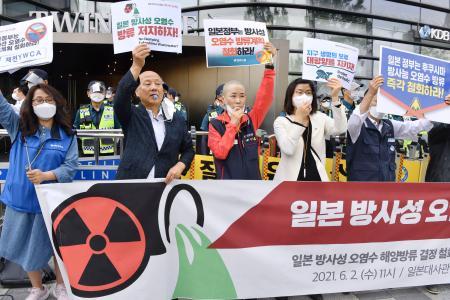IAEA Investigation Team, "No approval or opposition ... Responsibilities of each country" = Korea report
IAEA Investigation Team, "No approval or opposition ... Responsibilities of each country" = Korean coverage (image provision: Wowkorea)

The International Atomic Energy Agency (IAEA) investigative team, which is verifying the safety of the Fukushima Daiichi Nuclear Power Plant Water Ocean Release Plan, has revealed that it will not oppose the release of processed water or approve it.Is there a possibility that IAEA should conclude in a press conference held in a remote format on the 18th that IAEA should not release the process of processing water at a remote format on the 18th.In response to the question, he replied, "IAEA does not approve or oppose the decision. Because it was assigned (decision) under the responsibility of each country.""The decision to oppose or approve a project on nuclear safety must be made by the National Regulatory Organization (in each country)," said Deputy Evral.In response to the question "Is there any other way?", "Thinking for other options has been considered in the past," and this activity of the research team was a request for technical support from Japan that decided on a maritime release plan.He expressed his perception that it is done.He explained that the role of IAEA was provided to improve the nuclear safety regulations of each country in accordance with internationally recognized high safety standards, and to provide mutual evaluation whether the equipment to maintain safety is sufficient.The question of whether a nuclear specialist who uses Japanese is resident so that the status of Fukushima Daiichi Nuclear Power Plant can be fully grasped is "IAEA's role is not to be involved in regulations on site," "specific stage."We will visit the site if necessary. "Mr. Evral emphasized that "we are going to hear their concerns very carefully," regarding the fact that there are voices opposed to the release of processed water in South Korea and Japan.However, the IAEA Nuclear Safety and Security Bureau Gustabo -Caruso coordinator asked if there would be a plan to meet people who oppose the ocean and empty, such as fishermen groups and environmental organizations, or plans to meet in the future.I'm supposed to meet the partner I decided on the side. "He added, "We will evaluate based on IAEA's safety standards and publish a report later so that anyone can view it."The report on this survey will be completed around the end of April this year.The IAEA Investigation Team will collect samples such as processed water stored in the Fukushima nuclear power plant tank during this period and analyze at three research institutes, including Monaco and Austria.After arriving in Japan on April 14 this month, the IAEA Investigation Team visited the Fukushima Daiichi Nuclear Power Plant, and met the Ministry of Economy, Trade and Industry and officials of TEPCO, the operating company of the Fukushima Daiichi Nuclear Power Plant.The research team includes Kim Hong -seok, a researcher of the Korean Nuclear Safety Technology Authority, and Kim Hong -seok, a professor of KAIST Nuclear and Quantum Engineering.In addition, the United States, the United Kingdom, France, Russia, China, Vietnam, Argentina, Australia, Canada and Marshall Islands visited Japan as a survey team.The Japanese government has confirmed in April that the Japanese government plans to dilute the disposable water at the Fukushima nuclear power plant with multifunctional removal equipment (ALPS) and then dilute seawater and release the ocean.The Japanese government calls the "contaminated water" filtered by ALPS under the name "processing water."TEPCO has been planning to release processing water about 1 km away from the Fukushima Daiichi Nuclear Power Plant, using the Seabed Tunnel.According to the description of TEPCO, alps can remove 62 radioactive materials, including cesium, but trilitium (tritium) is not removed.
Copyright (C) Herald Wowkorea.JP 84
